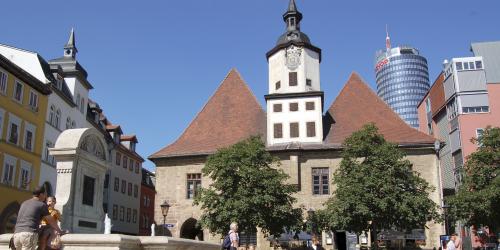
Jena is the first Thuringian city to adopt a climate action plan
The city council's resolution on the Climate Action Plan on Wednesday, April 19, 2023 marks the end of a year and a half-longdevelopmentprocess. Climate protection initiatives, internal and external experts and citizens have been working intensively on a roadmap that will lead Jena to climate neutrality by 2035. The climate action plan was developed under the leadership of target GmbH as part of a broad public participation process with six working group meetings, seven workshops and four public events. With the help of an online idea card, over 800 suggestions for climate protection measures were collected from the citizens of Jena.
"The adoption of the Climate Action Plan is an important signal for climate protection and paves the way for a sustainable city.I would therefore like to express my sincere thanks to everyone involved in its development: the planning office Target GmbH, the Department of Urban Development and Environmental Protection with Mayor Christian Gerlitz and the municipal climate protection coordinator Mr. Muschalle-Momberg and, of course, the many citizens who contributed their ideas and suggestions during the long participatory process," said Lord Mayor Dr. Thomas Nitzsche.
The climate action plan shows which measures should be implemented in order to achieve the goal of climate neutrality, what costs will be incurred by the city and how much manpower will be required. The impetus for this was a citizens' petition, which was adopted by the administration and passed as a city council resolution "Jena climate-neutral by 2035" on 14.07.2021.
"In view of the drastic warnings from the Federal Environment Agency and the recently published report from the Intergovernmental Panel on Climate Change, the adoption of the Climate Action Plan by the city council is an important, hopeful signal. It shows that we as the city of Jena are aware of our responsibility in the fight against advancing climate change and are facing up to the challenges that lie ahead. The Climate Action Plan provides us with a clear roadmap on how we can achieve climate neutrality by 2035. Now it's a matter of tackling the agreed measures in a structured way so that Jena remains a city worth living in in the future," says Mayor Christian Gerlitz.
Climate action plan: 73 measures in seven subject areas
The actual catalog of measures contains 73 measures in seven different subject areas that are specifically tailored to the city of Jena's scope for action. In addition to strategic projects, such as examining whether a climate protection agency should be set up or optimizing relations between the city and surrounding areas in terms of climate protection, measures are proposed in the areas of buildings and neighbourhoods, companies, administration, mobility, energy supply and climate-friendly lifestyles.
In the building sector , a building refurbishment campaign, the installation of photovoltaic systems on the jenawohnen GmbH building stock, the serial refurbishment of a neighborhood according to the energy leap principle and the implementation of a municipal energy-saving campaign are to lead to further energy savings.
Jena's companies , on the other hand, are to receive even better support in their transformation to climate-neutral companies in future through more services offered by the city of Jena and the offer of a regional green electricity tariff.
The city administration itself, according to the climate action plan, is to implement energy-saving models in schools, expand its corporate mobility management in a more climate-friendly way, install more photovoltaic systems on municipal buildings, intensify the conversion of its own vehicle fleet and cover city-owned parking lots with photovoltaic carports.
In the mobility sector , more climate-friendly traffic management, increasing the financial attractiveness of local public transport and converting the drive system of local public transport as well as a speed reduction concept should lead to a significant reduction in greenhouse gas emissions.
The food, consumption and public infrastructure sector (e.g. waste management) accounts for more than half of the greenhouse gas emissions of German citizens on average. This sector was therefore also considered in the Climate Action Plan and measures were developed that the city of Jena can influence. For example, climate-friendly nutrition is to be promoted in municipal facilities, food waste in the city is to be reduced and regional products are to be promoted more strongly in future.
The area with the greatest potential for savings is energy supply. Here, a whole bundle of measures is to put the city of Jena on the path to climate neutrality. In addition to the implementation of a photovoltaic offensive through a solar marketing concept, a municipal heating plan is to be developed that will form the strategic basis for the decarbonization of Jena's heating supply. The expansion of the district heating network is one of the proposed projects, as is the use of the potential for heat generation via Saale river thermal energy as a renewable energy source. Furthermore, the expansion and adaptation of the electricity infrastructure and the implementation of ground-mounted photovoltaic systems and wind turbines with an output of at least 30 MW are required in order to achieve decarbonization in the energy supply sector.
Climate Protection Coordinator Kevin Muschalle-Momberg says: "Yesterday's city council resolution marks the end of the development phase of the Climate Action Plan. The practical work, the implementation phase of the many individual measures, is only now beginning. Nevertheless, the adoption of the concept is already a great success for municipal climate protection."
Starting signal for implementation
The many climate protection measures have already been prioritized in the climate action plan. The immediate measures are therefore to beimplemented first in the coming months . Corresponding funds are already available in the municipal budget. The preparation of municipal heating planning, as a strategic basis for decarbonizing the heating supply for the entire city, will be a top priority. The administration has already made initial preparations for this.
